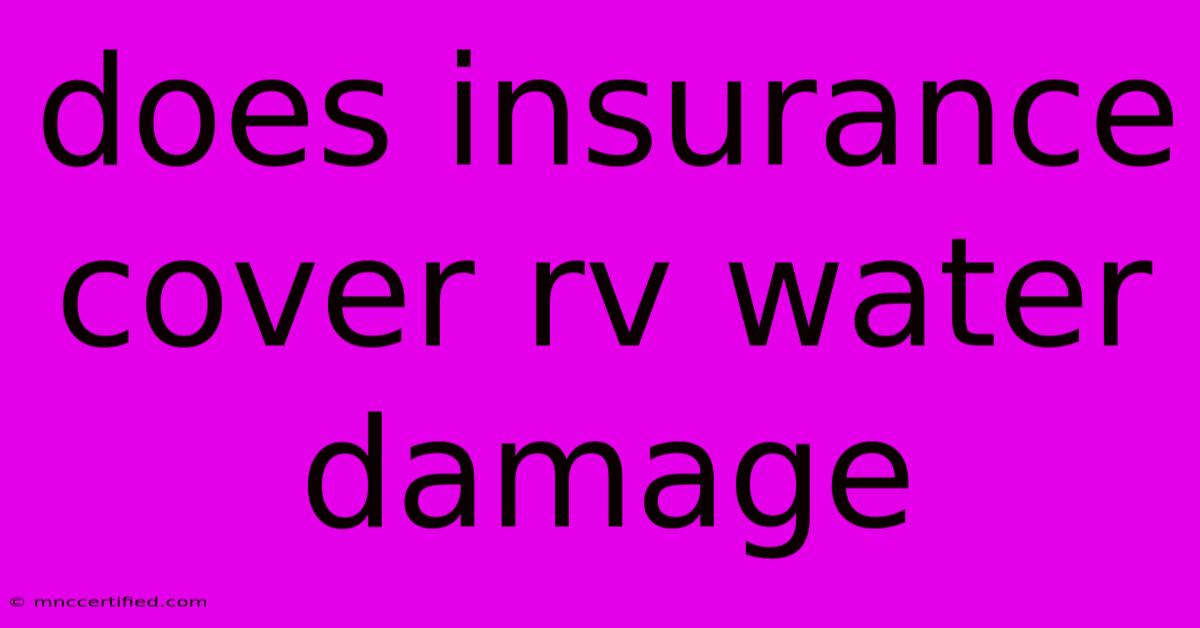Does Insurance Cover Rv Water Damage

Table of Contents
Does Insurance Cover RV Water Damage? A Comprehensive Guide
Owning an RV opens up a world of adventure, but it also comes with its fair share of potential risks. One of the most common and damaging issues is water damage. Whether it's a leaky roof, a burst pipe, or a flooded campsite, water can wreak havoc on your RV's interior and components.
So, does your insurance cover RV water damage? The answer is: it depends.
What Types of RV Water Damage Are Covered?
While insurance policies vary, most standard RV insurance policies cover damage caused by:
- Sudden and accidental events: This includes situations like a burst pipe, a leaking roof due to a storm, or a flooded campsite.
- Natural disasters: Flooding, hail, windstorms, and other natural disasters are typically covered under comprehensive coverage.
What Types of RV Water Damage Are Typically Not Covered?
However, there are several scenarios where your insurance might not cover water damage:
- Neglect or lack of maintenance: If the damage is caused by a known leak that you failed to repair or maintain, your insurance may deny your claim.
- Wear and tear: Normal wear and tear on your RV's plumbing system, like a slow leak, is usually not covered.
- Pre-existing conditions: If the water damage is a result of a pre-existing condition, such as a faulty roof that was leaking before you bought the RV, it may not be covered.
- Lack of proper winterization: If your RV freezes and sustains damage due to inadequate winterization, your insurance might not cover it.
Understanding Your Policy
To understand exactly what your insurance policy covers, it's essential to:
- Read your policy carefully: Review the terms and conditions of your policy to see what is and isn't covered. Pay close attention to sections related to water damage and exclusions.
- Contact your insurance agent: If you have any questions or doubts, reach out to your insurance agent for clarification. They can explain the specifics of your policy and provide you with the best advice.
- Consider additional coverage: You can often purchase additional coverage, such as flood insurance, to protect your RV from specific risks.
Preventing Water Damage
The best way to avoid water damage is to be proactive and take preventative measures:
- Regularly inspect your RV's plumbing system: Check for leaks, loose connections, and damaged pipes.
- Maintain your roof: Ensure your roof is properly sealed and free of any leaks.
- Winterize your RV: Properly winterize your RV before storing it in cold weather to prevent freezing damage.
- Use a water filtration system: Installing a water filtration system can protect your RV's plumbing from sediment and contaminants.
Conclusion
Water damage can be a costly and stressful problem for RV owners. While insurance can offer some protection, understanding your policy and taking preventative measures are crucial. By staying informed and taking the right steps, you can minimize the risk of water damage and protect your investment. Remember, if you have any doubts or questions, don't hesitate to reach out to your insurance agent.

Thank you for visiting our website wich cover about Does Insurance Cover Rv Water Damage. We hope the information provided has been useful to you. Feel free to contact us if you have any questions or need further assistance. See you next time and dont miss to bookmark.
Featured Posts
-
Health Insurance Brokers St Louis Mo
Nov 11, 2024
-
Margaret Bonds Montgomery Variations
Nov 11, 2024
-
Erie Insurance Beckley West Virginia
Nov 11, 2024
-
How To Watch Real Sociedad Vs Opponent Live
Nov 11, 2024
-
Does Furnished Finder Have Insurance
Nov 11, 2024